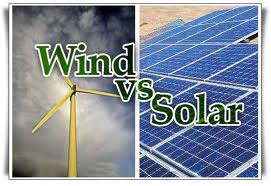So far, I focused more on solar energy as a more efficient alternative to electricity. The thing is, solar energy is not the only option. Maybe for some of you, wind power is a more suitable solution.
I did a little research, talked to Bob and here I am giving you some advices on how to choose between the two of them.
The first step in determining which renewable energy solution is best for your home is to begin by doing research. Often, consumers must choose between two of the most popular types of renewable energy solutions: solar energy and wind energy. Here are the 2 most important aspects you should consider when you decide which solution is best for you:
Location
Your geographic location will play a huge role in determining which solution is best for your needs. In some parts of the country, solar energy solutions are most likely to generate the most power because these parts of the country receive lots of sun exposure.
However, in other parts of the country with less sunlight solar power solutions can provide only minimal energy. For instance, solar power won’t really work in Alaska during winter, as the inhabitants spend much of the time in the dark.
Also, when it comes to geographic location, sun exposure isn’t the only consideration to bear in mind. Consumers may also want to think about the wind that surrounds their homes.
Consumers who live in some Western states, rural communities, mid-west states, and areas with plenty of wind are likely to have the opportunity to get plenty of energy from wind powered technologies, such as wind turbines.
These technologies are powered when wind blows through turbine propellers, which then crank the turbine. As the turbine rotates, it builds energy, which is then stored in a battery or used right away. However, geographic locations that do not have much wind exposure may not be able to get as much energy generation from wind-powered technologies, as the wind may not blow hard enough, or frequently enough, to produce energy.
Codes and Regulations
In most parts of the country, homeowners will be directly impacted between the building codes and government regulations that govern their technology installations and usage. Some renewable energy solutions are easier to implement than others when it comes to passing these regulations.
For instance, in urban environments where homes are close together wind turbines may not be acceptable renewable energy solutions, as wind turbines require a good deal of space to safely rotate—and can lead to dangerous situations if the mechanism breaks.
Solar technologies are most likely to be more widely accepted in the majority of locations throughout the U.S. Solar technologies may not only be installed on rooftops (as long as they abide by building codes and regulations), but they may also be installed in smaller scales, such as with the case of solar power water heaters, which may require only a small solar panel to produce enough energy to heat a water heater.
To determine the best renewable energy solution for your needs and locations, be sure to check with your local building code office, state regulators, and experienced renewable energy contractors in your area who can provide specific advice for your needs. Maybe it feels like hard work now, but it will payoff in the end!
Now, since I approached this topic now, I feel compelled to tell you one or two more things about wind power. Next time, I’m gonna give you some tips that may come in handy if you decide to buy a wind turbine.



No comments yet... Be the first to leave a reply!